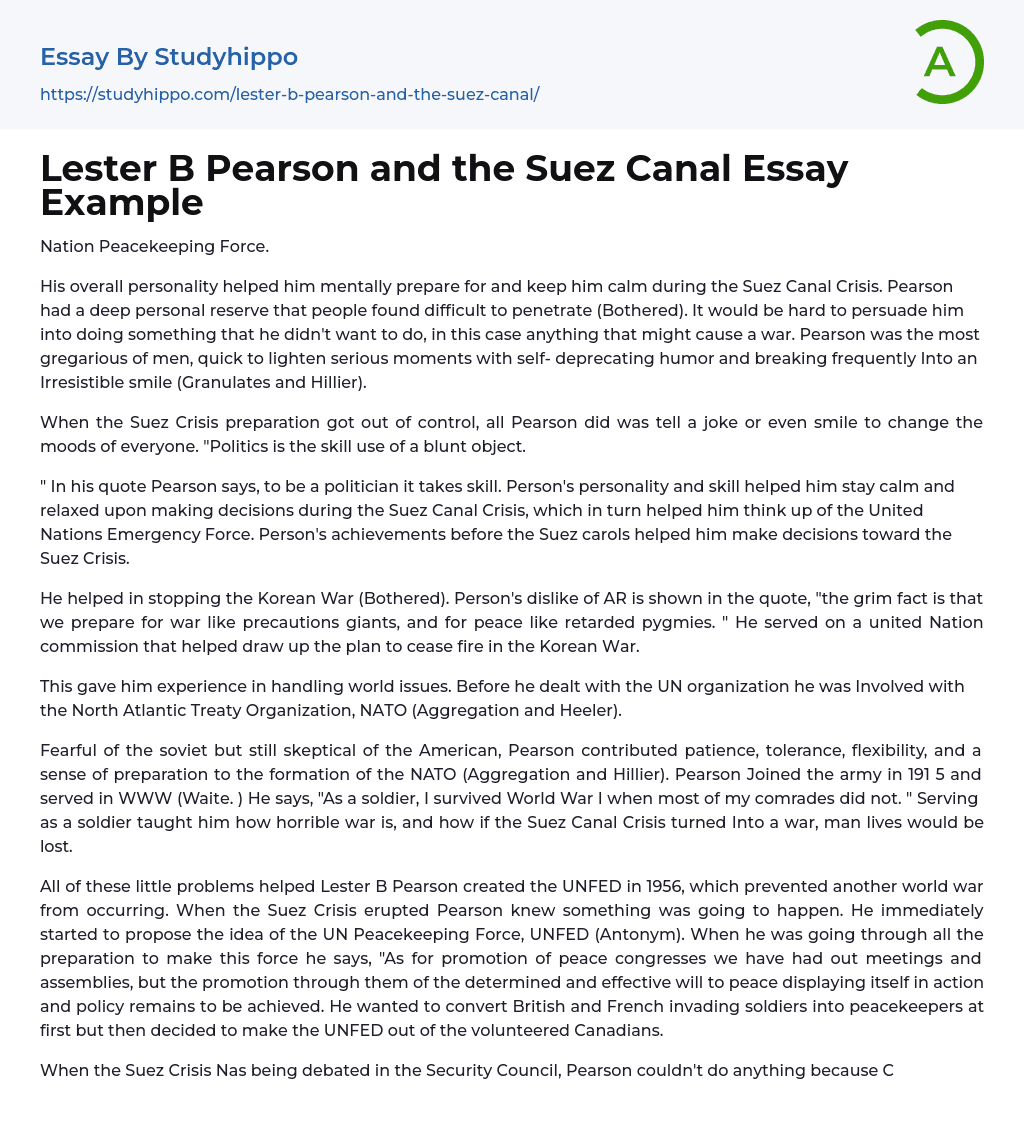Former Canadian Prime Minister Lester B. Pearson's personality provided him with the mental fortitude to remain calm during the Suez Canal Crisis despite his reserved disposition. Nevertheless, he had a quick wit and sense of humor that often defused tense situations. When overwhelmed by preparations for the crisis, he lightened the mood with his jokes and smile, which helped him make critical decisions while remaining composed. Pearson believed politics required skill and once said, "Politics is the skill use of a blunt object." With past achievements such as stopping the Korean War and working on a United Nations commission to draw up a ceasefire plan in Korea, Pearson had ample experience to handle global issues. His accomplishments and character allowed him to propose the United Nations Emergency Force solution for the Suez Crisis despite his disdain for war since he re
...cognized preparation was crucial in averting it. Before dealing with NATO as Aggregation and Heeler, Pearson was wary of both Soviet Union aggression and skeptical of America's intentions towards Canada. Pearson's contributions to NATO included patience, tolerance, flexibility, and readiness for any eventuality - attributes essential in forming political alliances successfully.Pearson's firsthand experience of the terrible and costly nature of war, gained through serving in World War I, made him acutely aware of the potential loss of life should the Suez Canal Crisis escalate into another conflict. In response to this, he founded UNFED (Antonym) in 1956 with the aim of preventing another global war. When the Suez Crisis broke out, Pearson recognized that swift action was required and proposed an idea for a UN Peacekeeping Force. He knew from his previous participation in peace
congresses that these events would not be sufficient to promote peace effectively through policy and action alone. Although initially hoping to convert British and French soldiers into peacekeepers, Pearson ultimately formed a volunteer-based UNFED with Canadians due to Canada's lack of a permanent seat on the Security Council which prevented him from contributing directly to debate on the crisis. Through tireless coalition building efforts, Pearson's proposal for a peacekeeping force was overwhelmingly supported by the General Assembly on November 4th, 1956. This resulted in international pressure being applied and eventually led to British and French forces withdrawing from Egypt by year-end thanks to UNFED intervention. Although Pearson received praise at the UN for his role in preventing another world war, he also faced criticism domestically for allegedly betraying his country. Nevertheless, it is clear that his personality traits combined with past achievements played key roles in helping prevent another devastating global conflict.If the Suez Crisis had led to a worldwide war with atomic bombs being utilized, modern-day existence would be significantly altered. Consequently, Pearson was acknowledged for his contributions by receiving the Nobel Peace Prize in October 1957.
- Air Force essays
- Army essays
- Soldiers essays
- Army Values essays
- United States Army essays
- Veteran essays
- Aircraft essays
- Sergeant essays
- Culture essays
- Social Control essays
- Citizenship essays
- Social Justice essays
- Caste System essays
- Social Responsibility essays
- Socialization essays
- Deviance essays
- Modern Society essays
- Popularity essays
- Civil Society essays
- Community essays
- Female essays
- Filipino People essays
- Igbo People essays
- Indigenous Australians essays
- Indigenous Peoples essays
- Minority Group essays
- Social Institution essays
- Men essays
- The nation essays
- Middle Class essays
- Social Norms essays
- Discourse Community essays
- Popular Culture essays
- Car Culture essays
- American Culture essays
- Mormon essays
- Indian Culture essays
- Mexican Culture essays
- Pop Culture essays
- Cultural Differences essays
- Culture Shock essays
- Different Cultures essays
- World War I essays
- World War Ii essays
- Atomic Bomb essays
- American Civil War essays
- Attack essays
- Cold War essays
- Crimean War essays
- Emilio Aguinaldo essays




